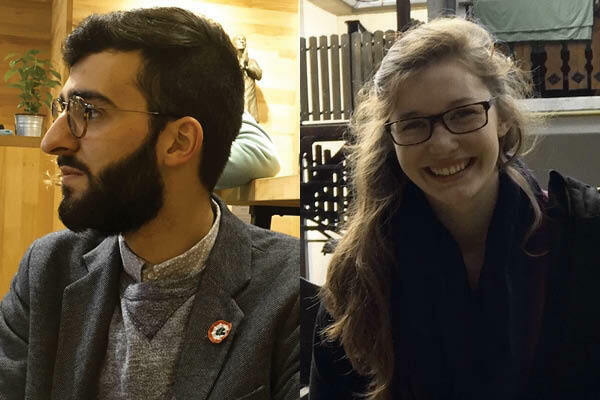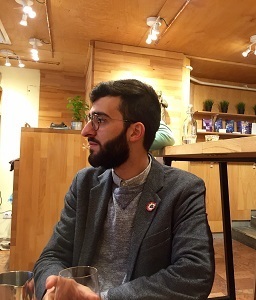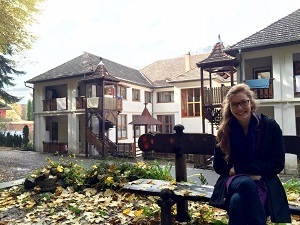
The Nanovic Institute sent an undergraduate collaborative research partnership to Hungary and Romania last fall break to research support programs for underprivileged and marginalized children. Daniel Barabasi ('17), a double-major in Neuroscience & Behavior and Advanced Physics, has a personal stake in his research: he has strong personal, familial, and linguistic connections to the region. Claire Alexander ('18), a major in Neuroscience & Behavior, on the other hand, has a history of local volunteer work with underprivileged youth and of related laboratory work. Together, they made a great team! They recently wrote to us about their experience.
From Daniel Barabasi:
On a wide range of issues, the European Union has a set minimum expectations that its members must confirm to in order to join and receive benefits. These thresholds, naturally, are not set as end goals, and the body anticipates that the regulations will be a set of cornerstones for the care a state provides for its inhabitants. Eight years after its accession into the ranks of the EU, concern may arise whether Romania has pursued sufficient growth, or has simply accepted stagnation in the introduction of new social development programs. Can the support that local NGOs provide be sufficient, or does the nation have a responsibility to reexamine levels of social welfare?
The Romanian child care system has become the quintessential study for the cognitive development of individuals extremely lacking human contact. Research by Charles Nelson and Harry Chugani from the last 10 years has shown that Romanian orphans receive virtually no mothering, leading to borderline mental retardation and stunted brain development. Even before such data has been available local individuals have identified significant issues with the social programs of the developing country; however, the impact of the services the proliferating NGOs provide has not been investigated in depth.

Over the course of a week, I reached out to NGOs in Budapest and rural Transylvania who were involved with providing services to underprivileged children and individuals with mental or physical disabilities. Many of these organizations bloomed after recognizing an intense need for character building and moral development in the post-communist society. Attila György, administrator at the Saint Gellért Foundation, saw that his work came about to combat the cultural and societal degradation the region faced after having free thought and creativity be outlawed under Soviet rule. György especially lamented the impact of focusing school toward higher education in a territory where the workforce remains rooted in practical jobs.
A common theme among NGO goals was to supplement the standard educational framework put forth by the Romanian government. They have found that the system works well for the average, “standard” families; however, the fringes receive little to no support. For this reason, families with children on the autistic spectrum have founded the AutHelp Association in the region in order to provide proper care. Through various Hungarian and Romanian grants, complemented by collections from the community, the association has secured several special education teachers who run a separate curriculum in a small room in the high school. Depending on the intensity of the affliction, these children may attend one or two classes throughout the year with the rest of the school, but spend most of their time in special care.
Similar origins stories emerge for other organizations. Brother Csaba Böjte began the Saint Francis Foundation of Déva to provide basic necessities for the underprivileged children he saw milling about the streets. I had a chance to discuss current projects with the leader of two of the homes owned by the organization, with children ranging from ages 3 to 18. On top of the food, shelter and community, the homes hope to develop character through daily chores. Furthermore, one home specializes in developing skill in animal husbandry and the service industry, especially restaurant and hotel management. In the summers many of the children return to their families, but caretakers often “check in” by calling the children back to the homes for summer camps or help with upkeep on the property.
Another group, the Handicapped Organization of Harghita County, also emerged to serve an underrepresented niche in the community. Throughout years of self-organization, the group has developed a large cache of wheelchairs and crutches, as well as profitable work-therapy program centered around candles and sewing. Traveling with the leader of the organization, an enthusiastic single-arm amputee named Csaba Fikó, I was able to see the site of their future, handicap-accessible, building, and the cramped conditions less-fortunate mentally disabled students experience.
My time in rural Transylvania has challenged my understanding of the Romanian government as a force for social good. Admittedly, developing structure and trust in the government in a post-Ceausescu climate should prove difficult, but this does not mean a lack of meaningful social programs should be tolerated. Indeed, a few of the organizations I met with did their best to limit the federal aid they received, as they were afraid that the regulations more resources would come with would jeopardize their integrity and level of care. Romania should strive to encourage the development and care of its people, and reward those who succeed at this task.
I traveled to Transylvania to return to my work on social and economic hardships in the region. At the time, I had discovered the hurdles that many social organizations face when working to provide care to underprivileged children, and had pledged to find ways to rally support in the United States. I feel like I have found too many to handle. In the short term I plan to organize summer camps through the Hungarian Scouting Association, at which underprivileged individuals can develop spiritually, emotionally, and socially. With my writing, activism, and work I hope to inspire others to become invested in the difficulties that Transylvania, and similar regions, experience. I remain indebted to the Nanovic Institute of European Studies for aiding my efforts to understand my familial land, and will keep the Institute in mind when addressing and discussing the issues I continue to encounter in this lifelong endeavor.

From Claire Alexander:
Impoverished and marginalized children are at a major disadvantage when it comes to intellectual, emotional and even physical development. Several organizations in Hungary and Romania work tirelessly to alleviate these setbacks by educating, housing, and supporting these children, who have enormous potential as human beings but who are generally ignored because of their social status.
Early childhood education is one of the most important parts of a child’s life, and indeed an adult’s life. Young children cultivate communication, problem-solving, and early academic skills that they will benefit from for the rest of their lives. However, some children are not able to access this education or are discriminated against in a way that impacts the way that they are educated. In October of 2015 I traveled to Hungary and Romania to investigate the ways that impoverished children are being helped to receive education and support throughout the year, and how organizations are making efforts to end the segregation of schools between Roma and Hungarian children.
Romania has achieved a negative reputation for its issues with child welfare, and in the early 1990s this manifested as a large wave of adoptions to other countries. As investigated by Groze & Ileana (1996), these children were affected by not only their unstable environment but also the institutions in which they were temporarily placed, and the transitions between homes. These effects included difficulties with social bonding as well as possible problems with emotional and physical development. Walker et al. (2011) provided a summary of the possible negative and positive factors which can greatly influence a child’s development. They emphasized the point that impoverished children are especially at risk because of an environment of chronic stress, along with the increased possibilities of maternal depression, lack of sufficient education and resources, deficits in cognitive stimulation, and exposure to disease. Rutter (1998) studied specifically the development of Romanian children adopted into the U.K., and found that their development was significantly behind that of their native English counterparts, as well as being in general poor health due to intestinal and respiratory infections. Rutter found that after four years in the U.K., those adopted before 6 months of age had almost entirely caught up developmentally to the native English children, but those adopted after 6 months of age were still at a disadvantage. All of these studies indicate that psychological influences are as relevant, if not more, to children’s development as physical influences.
In my research of educational opportunities I conducted two interviews. The first interview on the trip took place about an hour outside of Miercurea-Ciuc, Romania, in the town Sânsimion. I met with the site director of one of the St. Francis Foundation of Deva homes. We learned that this particular home houses 150 children between the age of 3 and 18 of Hungarian ethnicity, who receive both a formal education and practicum in guest services, animal care, or mechanics. The future careers of these children depend on their social and academic statuses and they are matriculated into whatever track will suit their skills and opportunities the best. The homes are made to be very structured, organized, and brightly lit, to contrast the family homes that many of the children come from. Only about 66% of these children are able to return home over the summer, because 40-50 have parents who have moved out of the country, are abusive, are entirely homeless, or unable to care for their children for other reasons. Of the 100 who return to their families, some are brought back early by the foundation because of concern that parents are overworking their children or sending them out to beg. The children who stay at the home over the summer participate in spiritual, nature-based, or arts-based camps that are also open to other local children, or keep busy by helping make meals or maintain the facility. All of these children must deal with a duality of chaos and negativity at home with the structure and integrated spiritual activities of the St. Francis Foundation home, but they are provided with tremendous support from the community and are able to vastly improve their own futures because of the organization.
The second interview was with the associate lawyer of the Chance for Children Foundation, centered in Budapest. The foundation tackles the serious issue of segregation of Roma children in Hungary. Children in this marginalized group are separated by classroom or school for their entire education, and many drop out early because of financial issues and a necessity to work or beg. Because of discrimination and misunderstanding, their cycle of poverty is perpetuated. CFCF has a two-pronged approach to this problem: strategic litigation which takes place in Budapest with the goal of steadily outlawing this separation, and community outreach in two sites outside of Budapest. The current program of the outreach branch is called “Can I Sit Next to You,” and invites Roma and non-Roma parents to support and empower the movement to de-segregate schools. The foundation is limited in resources, however, because of the lack of governmental support, and remains small – a model for its campaign.
Although the education system in the United States is a common topic of debate and improvement, few people in the US know about issues in education abroad, or how we can form symbiotic relationships with organizations even across the globe. American school systems have much to learn from the Hungarian community outreach approach, and organizations in Hungary and Romania could (and some do) benefit from American support. The St. Francis Foundation of Deva has been able to expand its programs because of private fundraisers in the United States, and further partnerships would aid all groups involved. Similarly, the Chance for Children Foundation’s dual approach of strategic litigation paired with community building and outreach would serve as a formidable model for education reformers in the United States.
This research trip gave me insights to other cultures as well as their situation regarding children who are marginalized or in poverty. As a student planning to pursue a graduate degree in psychology or neuroscience, it is not only the research about developmental issues which interests me. It is also the process of gaining empathy for and understanding of the people that I will eventually be helping, through research or counseling. Building these skills is a vital factor for continuing in my professional career. In addition, the exposure to developmental and educational issues made it clear that these topics would make a senior thesis that would be very interesting and relevant to my future field.
Works Cited
Groze, V., & Ileana, D. (1996). A follow-up study of adopted children from Romania. Child and Adolescent Social Work Journal, 13(6), 541-565.
Rutter, M. (1998). Developmental catch-up, and deficit, following adoption after severe global early privation. English and Romanian Adoptees (ERA) Study Team. J. Child Psychol. Psychiatry 39(4), 465–476.
Walker et al. (2011). Inequality in early childhood: risk and protective factors for early child development. The Lancet, 378(9799), 1325-1338.